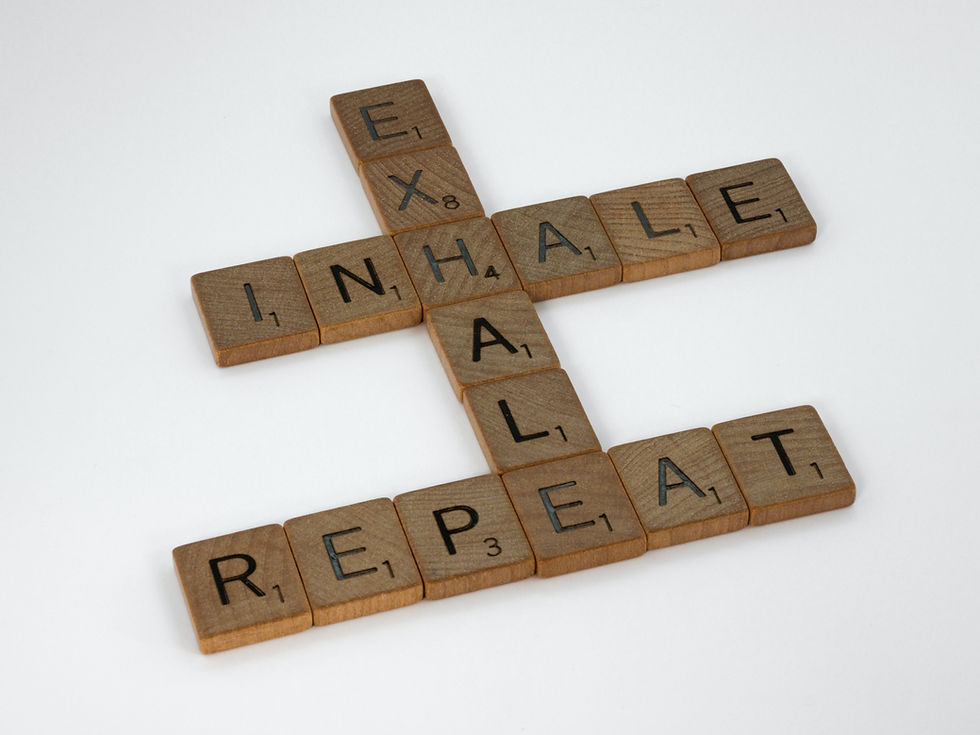Self-Care Check-in: Do Your Adrenals Need Support?
- Mary Kate Fuller, MS, CNS, LDN, CHHP

- Feb 15, 2022
- 4 min read
Updated: Jun 23, 2025
Understanding Your Adrenal Glands
The adrenal glands are small, triangular-shaped glands located on top of your kidneys. Though small, their role in your body is mighty—they produce hormones that influence nearly every system in your body including your metabolism, immune response, blood pressure, hormone balance, energy production, and how you manage stress.
In functional medicine, adrenal health is part of what we call the HPA Axis—the communication pathway between the hypothalamus, pituitary gland, and adrenal glands. When this system becomes dysregulated from chronic stress, poor nutrition, lack of sleep, or unresolved trauma, the body can no longer adapt efficiently, leading to symptoms often described as adrenal fatigue or HPA axis dysfunction.
Signs Your Adrenals May Need Support
When your adrenals are underperforming or overworked, you may notice:
Fatigue, even after a full night’s sleep
Cravings for salt, sugar, or caffeine
Irritability, mood swings, anxiety or low mood
Brain fog and difficulty focusing
Weight gain, especially around the midsection
Worsening PMS or menopausal symptoms
Low libido
Digestive issues, especially constipation or bloating
Low blood pressure, dizziness when standing
Hair loss, brittle nails or dry skin
Increased illness or longer recovery from colds/flu
Sleep disruptions (wired and tired at night)
Blood sugar instability, including hangry episodes
Common Triggers That Tax the Adrenals
Chronic stress is the #1 trigger for adrenal dysfunction—but stress doesn’t only mean emotional overwhelm.
Triggers can include:
Major life events (loss, divorce, trauma)
Childhood adversity or PTSD
Overtraining or lack of rest
Poor sleep hygiene
Inflammatory diets (processed foods, excess sugar or caffeine)
Blood sugar imbalance
Hidden infections (H. pylori, candida, Epstein-Barr virus)
Gut dysbiosis and food sensitivities
Toxin exposure (mold, heavy metals, pesticides)
Nutrient deficiencies (especially B vitamins, magnesium, vitamin C, zinc)
Functional Medicine Insight: The Adrenal Stress Continuum
Not all adrenal dysfunction looks the same. Your symptoms may reflect different
stages of HPA axis dysfunction:
Stage 1: Alert/Alarm – Cortisol is high. You may feel wired, anxious, or restless. Energy crashes after meals are common.
Stage 2: Resistance/Compensation – Cortisol production fluctuates. You may start to feel tired more often, especially in the afternoon, and begin to rely on caffeine.
Stage 3: Exhaustion – Cortisol output is depleted. You feel tired all day, may struggle to get out of bed, feel depressed, and experience more illness.
Functional lab testing like a salivary cortisol rhythm panel or DUTCH test can help determine which stage you're in and guide a targeted healing plan.
How to Support Your Adrenal Glands Naturally
1. Therapeutic Foods to Fuel Your Resilience
Choose nutrient-dense, whole foods that support hormone production, reduce inflammation, and balance blood sugar:
Healthy fats: avocado, olives, olive oil, coconut oil, ghee, grass-fed butter
Protein: pasture-raised poultry, grass-fed beef, wild seafood, bone broth, eggs
Slow-burning carbs: sweet potatoes, winter squash, quinoa, berries, beets
Adrenal-rich foods: kelp and seaweed (iodine), leafy greens (magnesium), cruciferous vegetables (detoxification), fermented foods (gut health), and Celtic/Himalayan salt (electrolyte balance)
Medicinal mushrooms: reishi, cordyceps, and chaga to improve resilience
Eat three balanced meals daily with 4–6 hours between meals to avoid blood sugar crashes and further stress on the adrenals.
2. Key Supplements and Nutrients
Always consult with us or your practitioner before starting new supplements.
Vitamin C – highest concentration is found in the adrenal glands
B-complex (methylated) – supports neurotransmitters and energy metabolism
Magnesium glycinate or threonate – calms the nervous system
Omega-3s – lowers inflammation
Vitamin D – immune regulation and hormone support
Adaptogens (taken based on stage of adrenal function):
Ashwagandha – balancing, especially good for cortisol highs
Rhodiola – energizing, helpful in burnout
Holy basil – calming and grounding
Licorice root – supportive in low cortisol stages
Maca – hormone and libido support
Eleuthero (Siberian ginseng) – great for rebuilding strength and stamina
3. Essential Lifestyle Support for Adrenal Healing
Get sunlight in the morning to reset your circadian rhythm
Sleep 7–9 hours nightly, in bed by 10pm when possible
Avoid overexercising, especially intense cardio if in burnout stage
Practice mindfulness, prayer, or meditation daily (10–20 minutes)
Support lymphatic flow with castor oil packs, infrared sauna, gentle stretching or dry brushing
Say no to caffeine and energy drinks during the healing phase
Hydrate with filtered water and a pinch of mineral-rich salt or electrolyte powders
Create space for joy: laughter, music, hugs, sunshine and play are therapy, too
When to Test and Get Support
If you're unsure what stage of adrenal dysfunction you're in or you’ve tried supportive steps without results, it’s time to test.
We offer functional lab testing including salivary cortisol rhythms and DUTCH hormone testing to assess adrenal output, hormone balance and even nutrient depletion. With your results, we create a highly personalized, step-by-step plan to bring your energy and vitality back.
Ready to Reclaim Your Energy?
If you're feeling run down, wired-but-tired, or simply not yourself, your adrenals may be calling for help. We’re here to support you with personalized nutrition, lifestyle guidance, and functional testing that gets to the root cause of burnout.
Schedule your free 15-minute discovery call today and let’s get you back to feeling balanced, energized, and well.









Comments